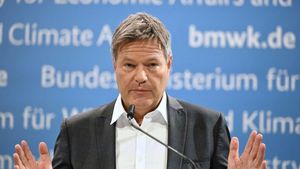Ukrainian President Volodymyr Zelensky has ignited international discourse by announcing he is willing to resign from office if it would facilitate Ukraine's accession to NATO or lead to peace. Speaking during a press conference on the eve of the third anniversary of the Ukraine-Russia war, Zelensky underscored the dire need for immediate security guarantees from both European nations and the United States.
Zelensky’s audacious declaration came after significant escalations marked by one of the most intense drone attacks carried out by Russia. "I would be happy if it were for peace in Ukraine. If it needs me to leave my post, I am ready to do this, and I can also do this for Ukraine's accession to NATO," he stated during the conference, emphasizing the persistent threat posed by the Russian invasion.
Over the past three years, Zelensky has navigated the brutal realities of war, and his willingness to resign holds weight as it signals desperation for any form of resolution to the drawn-out conflict. Currently, the Ukraine-Russia war poses catastrophic consequences, costing Ukraine approximately $320 billion, as per Zelensky's own words. He elaborated on the necessity for democracy and peace to prevail, reiteratively highlighting the urgency of NATO membership as strategic. "We are making progress," Zelensky insisted, discussing the potential agreements with the United States concerning the extraction and use of Ukraine's extensive natural resources, which include minerals and rare earth elements valued at hundreds of billions of dollars.
Throughout his address, Zelensky laid bare the ramifications of the war and articulated his deep concern over the lack of credible security guarantees from Western allies. He stressed the risk of yet another failed ceasefire, which would allow Russia to regroup and continue its aggressive posturing. "Another ceasefire would simply give Putin time to finance his war machine," echoed the views captured by the editorial board of the Wall Street Journal, substantiative of Zelensky's conviction.
The backdrop to the urgent offers and negotiations includes not only the military situation but also political interactions with key global players. Donald Trump, the former U.S. president, remains vocal about Ukraine's dealings, calling for economic agreements tied to the resources, insisting, "If your conditions are 'We won't give you aid if you don't sign the agreement,' then it is clear - we may have to do it." Zelensky has been adamant, continuously negotiating under his terms but refusing to sign agreements deemed oppressive or detrimental to future generations of Ukrainians.
Zelensky’s statements were bolstered by promises from EU leaders. Ursula von der Leyen, the President of the European Commission, pledged unwavering support for Ukraine, emphasizing military and financial backing from the EU and aid from European nations. These commitments provide some hope for Ukrainian resistance against Russian aggression and also set the stage for consequential discussions around NATO membership.
The situation remains fluid as talks persist. Zelensky is hopeful his negotiations with the EU will lead to favorable outcomes, expressing, "We need to focus not on years, but weeks," indicating the urgent need for actionable plans to reinforce Ukraine's defenses as the war drags on.
Critics and supporters alike are closely watching these developments, particularly Trump's balancing act between Moscow and Kyiv. Despite his earlier hardline policies toward Russia, Trump has suggested direct negotiations between the U.S. and Russia on Ukraine, reflecting perhaps his inclination to stabilize relations for the benefit of both nations, yet it puts Zelensky's administration on the back foot.
The tensions culminated as Russia prepared for upcoming negotiations concerning their involvement and control within the occupied territories of Ukraine, with Moscow vehemently stating it will never concede these territories, claiming they are integral to the Russian state.
On the other hand, Zelensky’s plight exemplifies the immense pressures faced by leaders during wartime—a need for sovereignty, peace, and the agency to advocate for their nation's future. With the backdrop of international support permeated by skepticism of peace negotiations, Zelensky's proactive measures could represent either potential victory or jeopardy for his presidency and his people.
With the eyes of the world on Ukraine, the next steps taken by Zelensky, Trump, and their European counterparts could very well dictate the future of peace and security within the region, making it imperative for both diplomacy and determination to coincide.



